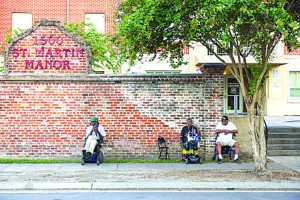8 September 2025
By Tristan Barvick
Contributing Writer
(Vertigines.orc) — A New Orleans law aimed at boosting disaster planning at certain senior housing facilities has mixed results four years after the hurricane that prompted it.
Passed about two months after Hurricane Ida struck New Orleans in late August 2021, the law requires the dozens of independent living facilities in the city to obtain an annual license, develop emergency plans and coordinate disaster responses with city officials. During the extended citywide blackout after Ida, many of these facilities were abandoned by staff, forcing residents to fend for themselves in darkness and broiling heat. At least eight people died from excessive heat and other health issues at the city’s independent living facilities in the days after the storm.
Unlike nursing homes and assisted-living apartments, independent living facilities aren’t regulated by the state or required to have on-site staff or backup generators. Independent living facilities are generally more focused on socialization than on daily care or medical needs.
As of late last month, about a third of the 71 independent living facilities in New Orleans were still not in compliance with the law, according to city Health Department data. Sixteen of the facilities that have yet to reach compliance submitted license applications that were approved, but no licenses were issued because the associated fees weren’t paid. Ten others submitted incomplete applications, according to the data, which was compiled by the department in late August.
It’s not a great compliance rate, but pretty good for New Orleans, which often takes a “wait-and-see attitude” toward disaster planning, said Howard Rodgers, executive director of the New Orleans Council on Aging, which provides social, educational and food services to the city’s elderly residents.

Residents sit outside of St. Martin Manor, independent living apartments for seniors in the 7th Ward, on August 26, 2025.
Photo by Christiana Botic/Verite News and Catchlight Local/Report for America
“It’s a step in the right direction,” he said. “But a lot of the responsibility for taking care of the seniors isn’t on the individuals running the independent living centers, it’s back on the seniors.”
After four years, anything less than 100 percent compliance is inexcusable, said Shirley Holmes, a senior housing resident whose husband died from health problems related to the post-Ida blackouts, which took 10 days to fix.
“They need to be held responsible and be in compliance,” she said. “Just telling somebody they need to do something isn’t enough. They’ll put it off as long as they can. It can take so long that it can be deadly.”
The health of Holmes’ husband, Walter, deteriorated after power was lost at the Oak Villa Apartments in Algiers, where they lived at the time. An inoperative elevator made it difficult for the couple to leave, and no staff were available to help them down the stairs from their second-floor apartment. Walter Holmes began rationing his oxygen and missed a scheduled medical treatment. As his breathing troubles worsened, an ambulance was called, but Walter couldn’t be revived at a hospital, where he was declared dead of heart failure.
The Oak Villa’s owner, real estate firm Latter & Blum, did not respond to requests for comment. The owners of several other independent living facilities either declined comment or did not respond. Shirley Holmes has since moved to a different apartment building.
Despite their more limited role with residents, independent living facilities should do more to plan and prepare for disasters, City Council members said in 2021.
“Many of the tenants were physically or financially unable to evacuate, and the owners and operators of the properties left them in inhumane conditions to fend for themselves,” then-Council member Kristin Gisleson Palmer said in 2021, shortly after the law was approved.
Facilities were slow to comply. In 2023, two years after the law was passed, most facilities were noncompliant. Last year, about a quarter of the facilities had not yet applied for licenses, according to the Health Department.
The threat of fines appears to have turned the tide somewhat, Rodgers said. In May 2024, the City Council approved new penalties for out-of-compliance facilities, including a $100-per-day fine during declared emergencies. The council also eased a requirement that facilities provide a list of all residents and on-site staff.
Last year, four fines were issued, according to the Health Department. Fines and related hearing costs totalled $1,350, with the largest single payment reaching $625. So far this year, a $1,000 fine with $125 for hearing costs was levied at a facility.
Rodgers said he would like to see the law strengthened, possibly with new requirements for backup generators and a mandated staff presence during disasters. He knows such measures would be costly for facilities, but he worries more lives will be lost when the next big storm comes.
“I know all that gets into profit margins,” he said. “But what we should be focused on is the best interests of our seniors.”
This article originally published in the September 8, 2025 print edition of The Louisiana Weekly newspaper.